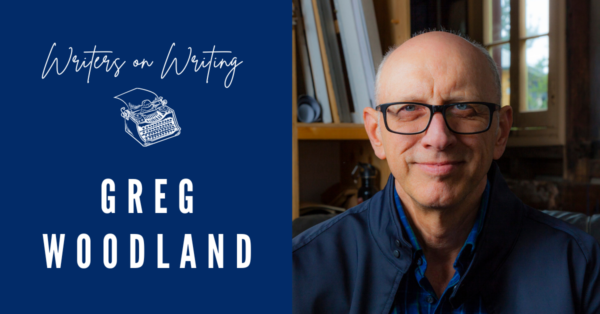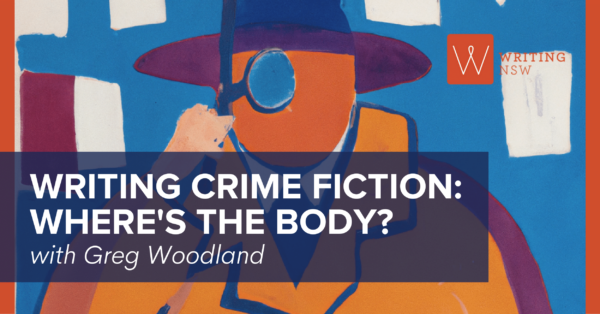
Writers on Writing is our regular conversation with a writer or industry professional about the writing craft, industry insights, and their own practice. This week, we spoke to Greg Woodland about writing crime fiction – and what drew him to the genre in the first place.
You were a screenwriter before releasing your first novel, The Night Whistler, in 2020. How did the writing process differ?
Screenplays and novels are very different beasts.
A screenplay is only 20-25,000 words, compared to four times that number for a crime novel. In a screenplay, typically you write only what the camera can see: images, action, dialogue. Characters are brought to life through their action; their interior life is revealed by voice-over narration, or through dialogue. But in a novel, as I discovered, you’re free to take the reader right inside the mind of the characters. And to look at the world through the filter of their senses.
So writing The Night Whistler and adapting my family’s story from the original screenplay meant opening up the world of the story, diving deeper into the characters, inventing more characters, and using their points of view and their various attitudes to build up the sensory details of their world into a richer and more complex landscape.
It’s tricky for someone used to using three-act structure and 100 pages to tell a story, but once I started to get the hang of novel writing, it felt incredibly liberating. It was great to break out of the tightness of the three-act structure, if I wanted to explore a certain path with one of the protagonists or go down a rabbit hole with another character here and there.
I loved doing what my editor called the ‘world-building’, bringing to life the town and the surrounding landscape and peopling it with interesting, flawed characters and using all this sensual detail – sights, sounds, smells, even tastes – to build up the ‘60s New England small-town setting in an evocative, authentic way. To have the room to do all that was sheer luxury – even if later, my editor would be going ‘lose this – tighten that!’
Screenwriting has taught me ‘not to hate the rewrites’. Screenwriting IS rewriting, as we say. But it’s the same with all writing. The story is built and finessed, and the narrative problems solved in the rewriting. That’s the process in both mediums, and it’s a process all writers had better learn to love, because it works.
What drew you to writing crime?
Crime is horrible. We see it every night on the news. And we don’t want it in our lives. But just as the sweetest songs are those sung in a minor key – to me, anyway – I’ve always been attracted to the darker stories.
As a kid, I was scared witless by the grim fairy tales my mum read me: Little Red Riding Hood, Snow White, Hansel and Gretel – about kidnapping, child abuse, cannibalism and murder – then the stories of Robert Louis Stevenson. By eleven or twelve I was devouring Roald Dahl’s blackly comic short stories, and Alfred Hitchcock’s ‘stories for late at night’, and I’d gone through all the Sherlock Holmes and the Agatha Christie books in the local library by the time I was thirteen. So I’ve been hooked on crime fiction from childhood. And I’ve never quite found the cure.
I think I’ve always loved the notion of a detective of some kind coming into a community to investigate a terrible crime, and sifting through all the chaos and turning things upside-down in their quest to find truth, and justice for the town, then restoring it to a kind of temporary peace (until next time). So following the advice of a well-known novelist – “don’t just write what you know; write what you read” – I started writing my first crime novel. It took some research, then two years and many drafts to write but I got there, finally.
I’m now writing my fourth crime book, and while I can’t say it’s gotten any easier, I think I am getting the hang of it.
You say crime novels have three important characters: the detective, the killer, and the place. What role does ‘place’ play in great crime writing?
Everything comes from place and is informed by place in most novels. To quote Lee Kofman’s wonderful book (The Writer Laid Bare), ‘Even when place isn’t the subject, in powerful literary works it usually has a strong presence.’
This is especially true in crime novels. I spent five years as a child growing up in Tamworth in the late 1960s, where the stalking incidents that inspired The Night Whistler occurred to my mother, when my father, who was a commercial traveller, was away on his business trips. Later I spent half the 1970s living in Armidale first as a student then a drop-out, doing odd jobs and working in a café as a dishwasher, so I got to know and love the area and its people quite well.
I wanted to write stories set there, because despite living in the city for decades, the sights and sounds and smells of the New England region are still very present in me and to a large extent have formed the person I am today. Both my published books and the next one in the series are set in a fictionalised version of that world.
The Australian crime fiction market has taken off in recent years. Are there any emerging Aussie crime authors you are excited about?
There sure are. The last two years have seen a bumper crop of new rural crime authors emerge. Hayley Scrivenor, Shelley Burr, Margaret Hickey, Dinuka McKenzie, Lyn Yeowart, they’re all writing brilliant, complex rural crime books. James McKenzie Watson’s gripping rural noir, Denizen, is a book that takes you down some dark and twisted rabbit-holes into the paranoid mind of a deeply flawed protagonist.
Greg Woodland is a former filmmaker who now works as script editor, screenwriter, and director of online script development business (www.scriptcentral.com.au). He’s taught screenwriting at film schools and unis including AFTRS, UTS, Macquarie University, and Australian Film Base, where he currently teaches a short course. Happily, Greg is also an author: his first crime novel, The Night Whistler, was published by Text Publishing in August 2020 and shortlisted for a 2021 Ned Kelly Award. The second book in the series, The Carnival is Over, will be published by Text in August this year. He’s currently working on the third book in his rural crime series set in the 1970s. Prior to writing crime fiction, Greg wrote a paranormal novel, Pangs, which won a Varuna Writing NSW Fellowship, and a Varuna Litlink Fellowship. He plans to rewrite Pangs this year as well as finishing his third crime novel.

If you want to be the first to read great advice, prompts and inspiration from our incredible tutors, subscribe to our weekly e-newsletter Newsbite.
More from Writing NSW
Check out our full range of writing courses in Sydney, our online writing courses and our feedback programs to see how we can help you on your creative writing journey. Find out about our grants and prizes, as well as writing groups across NSW, and sign up to our weekly newsletter for writing events, opportunities and giveaways.
